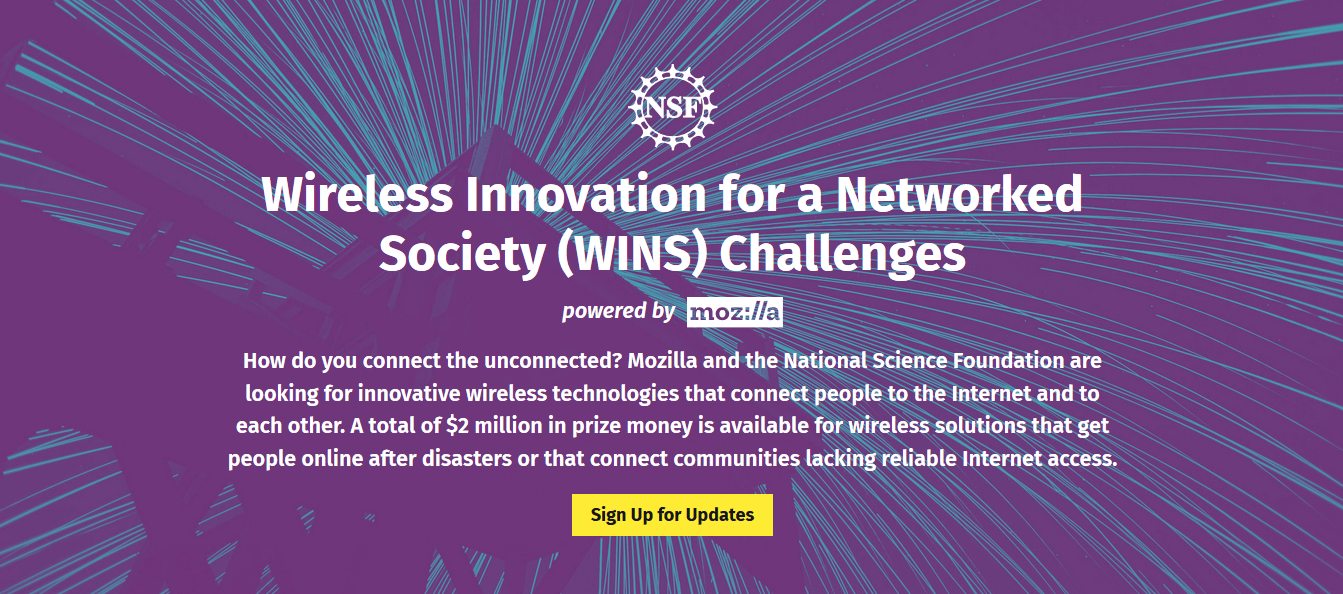Mozilla offers $ 2 million to create an emergency internet system

Mozilla and the US National Science Fund announced the $ 2 million Wireless Innovation for Networked Society (WINS) competition to create an alternative P2P network Internet concept that does not depend on commercial vendors.
Long ago the Internet was created as a scientific project for the exchange of information between laboratories and universities. But today it is not just a scientific experiment. This is a resource of public importance, the crash in which it is inadmissible. In the 21st century, lack of access to the Global Network is no longer just an inconvenience and can seriously impair the quality of life. People will not be able to communicate with friends and relatives, disappear access to electronic shops, services of state organizations, stop Internet banking, and so on.
Although we are already 2017, even in developed countries, a large proportion of the population lives in places where there is no good internet access. For the US, this is 10% of the population. Globally, 4.4 billion people do not have access to the Global Network.
In the face of disasters, people are left without communication, just when it is most needed. In order to be able to join the Internet and the regions lacking an online connection, Mozilla and the National Science Fund announced two competitions. Subscriptions are already accepted.
Off-the-Grid Internet Challenge
After earthquakes, hurricanes and other natural disasters, communications networks are one of the most fragile elements of infrastructure. The purpose of this contest is the use of wireless technologies and decentralized networks to provide online connectivity even when the central network is not working. This is necessary for people to have access to cartographic information and to be able to communicate with each other.
Participants in this contest must present devices with detailed hardware and software documented. The device must be portable and can be powered by a variety of electrical sources.
As an example, Mozilla points to a backpack that features a computer with a hard drive or flash drive, battery, and Wi-Fi router. The router will give wireless access to disk resources, such as geographic maps. Similarly, the installed instant messaging server should work. These devices must be able to connect to each other and provide mobile communications over long distances.
This wireless emergency system will be particularly useful in an apocalyptic scenario when, for some reason, authorities block Internet access for residents of their country. This is not at all fantastic at all: there are already countries where Internet access has been totally excluded in elections. If people have a backup system, they could exchange at least text messages. It is somewhat fun to compare internet exclusion by the authorities with a disaster.
Smart Community Networks Challenge
The second contest is not intended for help in natural disasters but for providing online connections for remote rural areas where there is no normal internet. Commercial vendors consider cables or optics to be unprofitable, and offer too high prices. Participants in this contest should figure out how to use existing infrastructure to provide quality internet for residents of these areas.
Mozilla cited an example of a wireless city network that uses abandoned telephone booths or other similar infrastructure elements.
The competition may involve individuals and teams, commercial and non-commercial organizations. US residents and people living in the United States can participate.
For a ranked concept or early project, prizes of $ 10 to $ 60,000 are awarded. And for working prototypes - from $ 50 to $ 400 thousand. The first stage participants will be invited to participate in the second.
Before submitting the project, a poll must be completed. The deadline is 15 November 2017 for the first stage and 22 June 2018 for the second.
*** Don't miss out on my next post! Follow me @bachoangel ***
It would be so cool to see some meshnets get a foot hold. Maybe something like this can give some of the devs some incentive. I'll let the Hyperboria folks know!